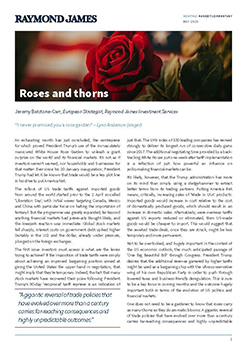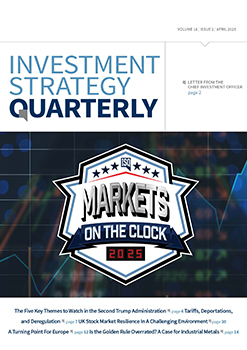“Absolutely crazy”. Those words could describe many events and individuals over the past week. But this week began with President Trump using them to describe President Putin, following a series of aerial attacks in Ukraine. Trump expressed strong disapproval and hinted at the possibility of imposing further sanctions on Russia. Ukrainian President Zelensky also responded to the attacks, accusing Russia of toying with diplomacy and showing no genuine interest in ending the war. His remarks underscored how far the situation remains from the long-hoped-for peace deal.
Monday marked Memorial Day; a U.S. bank holiday dedicated to honouring those who lost their lives in military service. President Trump appeared to be in good spirits, announcing a one-month extension on an EU trade deal deadline. While we’ve seen Trump use this playbook before, the move came as a welcome surprise. A proposed 50% tariff, set to impact the entire 27-nation bloc starting June 1st, was pushed back to July 9th. European markets responded positively, with the DAX 100 (Germany) closing 1.68% higher on the day. The euro also continued its upward trend against the dollar.
European Central Bank President Christine Lagarde has made it clear that she envisions the euro as a viable alternative to the US dollar as a global reserve and trade currency. Growing uncertainty surrounding US trade policies has prompted investors to reduce their exposure to dollar assets. Lagarde believes that the current geopolitical and economic climate presents an opportunity, one that the euro must “earn”. To seize the opportunity, Europe must reduce reliance on the dollar by promoting the euro as the preferred currency in trade agreements. Additionally, enhancing military and security capabilities will be essential to reassure investors of Europe’s geopolitical stability, an area in which Germany has already taken significant steps. “If Europe succeeded, the benefits would be large,” Lagarde stated. However, this is an ambitious goal. The US dollar still accounts for 58% of global foreign exchange reserves, compared to the euro’s 20% share.
A few months ago, Donald Trump boldly declared his intention to restore the United States to a golden age of manufacturing. This vision faces several clear challenges, including the need to build or refit factories, address workforce shortages, and reduce the country’s dependence on global supply chains. Global corporations are increasingly responding to the pressures created by Trump’s policies, with some beginning to reshore operations. For instance, BMW has announced plans to increase output at its South Carolina plant by up to 80,000 units. Similarly, Honda has stated their intention to relocate parts of car production from Mexico and Canada to the United States.
US PCE inflation for April eased to 2.1%, down from 2.3% in March. Core PCE (excludes food and energy) came in at 2.5% year-on-year, marking the lowest level since March 2021, which will please the Federal Reserve. Services inflation, one of the more persistent components of overall inflation, also showed signs of softening, easing to 3.3%. The Fed has indicated it remains “on the sidelines” as they continue to monitor how recent tariffs are filtering through to the data. The next Fed meeting is scheduled for 18 June, and unless there is a significant shift in the data, another pause in rate changes appears likely.
Nvidia reported strong first-quarter earnings on Wednesday, with revenues of $44.06 billion surpassing expectations. This marks the tenth consecutive quarter in which the company has exceeded earnings forecasts. There had been concerns that trade tensions between the US and China might disrupt this trend. Looking ahead, Nvidia expects to generate approximately $45 billion in chip sales in the next quarter. However, the company has accounted for an estimated $8 billion in lost sales due to US restrictions on the export of its H20 chips to China. Nvidia shares have risen by over 5% this week, bringing them back into positive territory for the year following notable underperformance in March and April.
German retail sales data released early this morning came as a surprise, showing a decline of 1.1% for April. This was well below market expectations, which had forecast a 0.2% increase, continuing the positive trend seen earlier in the year. The drop has been attributed to weak consumer confidence, driven by ongoing economic uncertainty, which particularly affected online retail and the food sector. Despite the disappointing figure, market reaction has been muted, largely due to a significant upward revision of March’s retail sales, from an initial -0.2% to +0.9%, a stark contrast.
This week brings a close to May – a month which has been strong for risk assets. The old adage of “sell in May and go away” has not worked, as equity markets have responded positively to what is perceived to be advances in trade and tariff negotiations. The summer months will prove interesting as the impacts of tariffs begin to be felt. So far it has only showed up in soft data, which has been very weak. Given this normally leads hard data by a few months there is the potential for some weakness, as such it makes sense to be diversified across a range of assets.
Nathan Amaning, Investment Analyst
Risk warning: With investing, your capital is at risk. The value of investments and the income from them can go down as well as up and you may not recover the amount of your initial investment. Certain investments carry a higher degree of risk than others and are, therefore, unsuitable for some investors.




